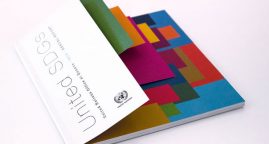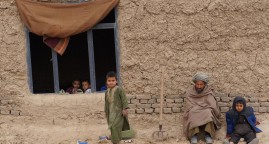British humanitarian NGOs face €145m post-Brexit shortfall
British NGOs received €145 million from the EU’s emergency aid department, ECHO, in 2015.
When the UK leaves the EU following Brexit, UK-registered non-profits will no longer be eligible for that funding, and the ECHO annual budget is also likely to shrink in the absence of UK contributions.
As official British aid is 100 percent “untied” – UK companies and charities are allowed no advantage in getting grants – replacing the lost ECHO funding from the UK aid ministry, DFID, could not be guaranteed without a major policy change.
Among the largest recipients of ECHO humanitarian funding last year were the British wings of multinational, or federated, NGOs, including International Rescue Committee, Oxfam, and Save the Children. These have affiliates registered elsewhere in the EU.
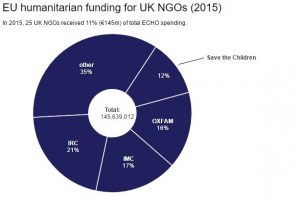
According to Toby Porter, CEO of HelpAge, a British NGO that contracted €1.6 million from ECHO in 2015, the transnational NGO groupings can route around the issue. In a blog post, he predicts: “the easiest workaround will simply be for the non-UK European members of the big global alliances to take over the contracting of EuropeAid and ECHO funding from their UK counterparts”.
However, among the 25 agencies funded by ECHO last year, several do not have such a sophisticated regulatory setup. Small NGOs that receive a higher proportion of their income from the EU face a bigger impact, and a future without EU funding. One British NGO manager told IRIN that it is facing significant uncertainty, and that losing the EU as a donor was only one of many issues to juggle, including exchange rate fluctuation. IRIN asked a number of other NGOs for comment but did not receive a response before publication.
ECHO funds represent, on average, only six percent of total income across the 25 recipients. The full list of grantees and Euro amounts is below:
EU humanitarian funding for UK NGOs (2015)
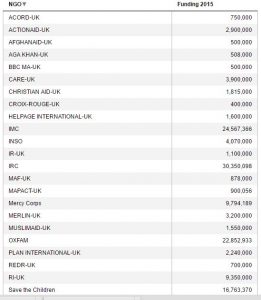
The EU’s overall international development budget is larger than the emergency aid spending of ECHO. Some of these funds also flow to British non-profits and contractors. According to UK NGO consortium BOND, its 400 members have, on average, 39 percent of their income from governments, and of that governmental income, 12 percent is from the EU.
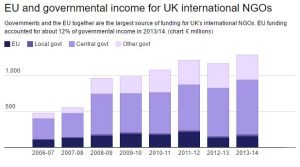
Read the article on IRIN website
Related Articles
UNOG Annual Report 2016
03/10/2017. While events in 2016 tested the United Nations and its partners, the year also proved that international collaboration lives on.
Afghanistan: Humanitarian concerns are growing
03/18/2016. Peter Maurer, has said he is increasingly concerned about the deteriorating humanitarian situation in Afghanistan.
Yemen: UN envoy urges Security Council to pressure warring parties to discuss peace proposal
03/30/2017. “The only real way to prevent a worsening of the situation is to reach a peaceful resolution”



